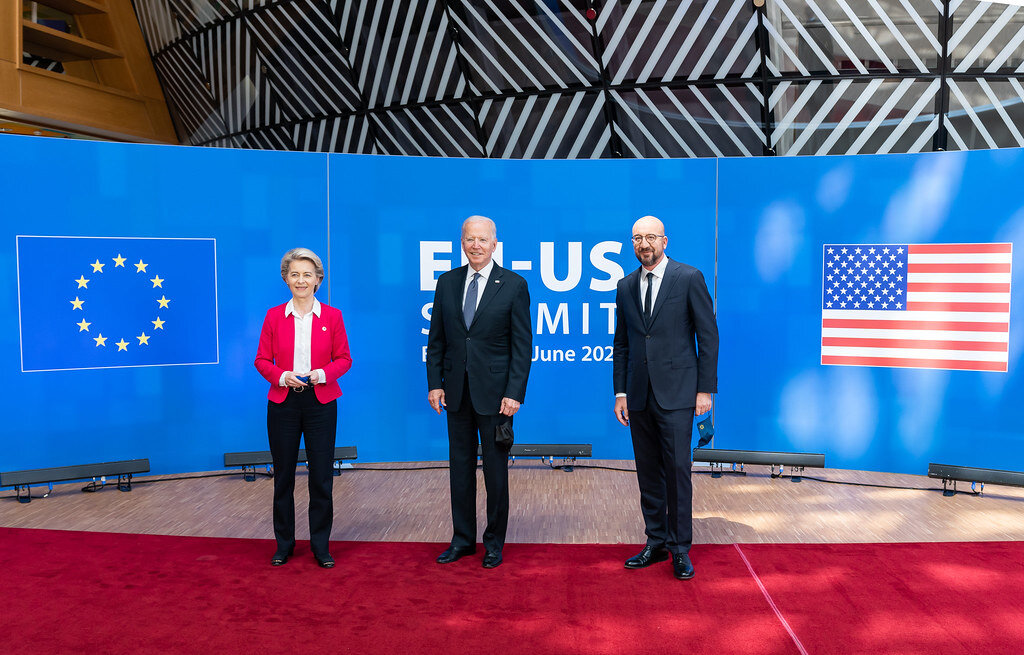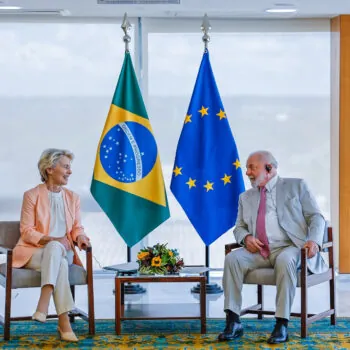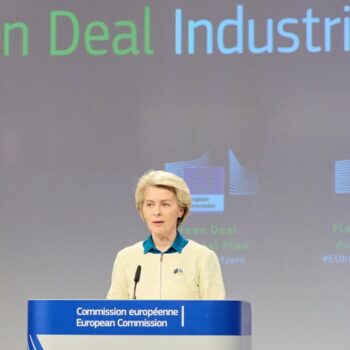- EU and US leaders look to the Trade and Technology Council as the critical platform for transatlantic dialogue, covering such issues as carbon accounting, clean procurement and electric vehicle charging standards.
- EU’s concerns over green subsidies in the US Inflation Reduction Act threatened to overshadow the third ministerial of the TTC, but both sides are trying to make headway on dealing with critical climate and trade issues through the launch of the Transatlantic Initiative on Sustainable Trade.
- As countries move from setting climate targets to implementation, tensions over trade-related climate policies will increase, coordination will be needed to ensure trade disagreements do not slow down the transition.
- The new Transatlantic Initiative on Sustainable Trade can kickstart discussions on shared principles on how to use green subsidies. EU-US work in this area can be fed into international forums like the WTO’s Trade and Environmental Sustainability Structured Discussions (TESSD).
Story – EU-US Trade and Technology Council
With the backdrop of the EU concerns over the Inflation Reduction Act (IRA), top EU and US leaders met for the third Trade and Technology Council (TTC) meeting in Washington, DC.
Leaders on both sides of the Atlantic often point to the TTC as the shining example of transatlantic cooperation, with demonstrable success in issues such as export controls to Russia or cooperation on key technological standards, but cooperation on climate and trade challenges has in some ways taken a back seat. However, the EU’s alarm bells over the impact of the IRA on European green industries demonstrate how trade disagreements between strong partners like the EU and US could undermine cooperation on climate. As countries draft policy to accelerate the transition there will be a stronger need for coordination. Both sides are committed to finding a solution through the EU-US Task Force on the IRA, although it will be important to find effective ways to prevent future disagreements.
The two sides agreed to launch the Transatlantic Initiative for Sustainable Trade to work on a wide range of climate and trade challenges, notably the initiative will work on the transparency and adequacy of green subsidies. The new initiative likely won’t tackle the current disagreement on the IRA, but rather it could prevent a future dispute. With the new initiative, the EU and US have an opportunity to work towards setting common principles around the use of green subsidies. This will be vital to avoid future trade tensions as both sides ramp up direct support schemes for transitioning different sectors. Cooperation with other allies and developing countries will be key to enhance the positive effect of subsidies for the transition globally. The work in the Transatlantic Initiative for Sustainable Trade can inform wider discussions on this topic in the WTO’s Trade and Environmental Sustainability Structured Discussions.
As countries accelerate climate action, more coordination on fair play rules around issues such as green subsidies and procurement are necessary to prevent future trade tensions on the road to net-zero. The TTC is the ready-made platform to begin this green overhaul of subsidy rules.
Quotes
Sarah Jackson, policy advisor for transatlantic climate diplomacy at E3G said:
“The launch of the Transatlantic Initiative for Sustainable Trade at the TTC is a positive signal that EU and US leaders are committed to tackling some of the most key sticking points on climate and trade. The latest dustup over the US IRA shows how critical it is for both sides to agree on fair play rules around green subsidies that speed up the transition and avoid trade tensions over climate policies – this new initiative offers a promising platform to kick off those discussions.”
Ignacio Arroniz, researcher on trade and climate policies at E3G said:
“Trade tensions among two closely integrated economies are natural. However, as countries move forward with their climate transitions, these tensions may eventually act as barriers to more ambitious climate action. The EU and US must showcase their commitment to fighting climate change by setting aside their differences and finding ways to work together – while supporting developing countries that lack their access to finance and technologies.”
Available for comment on EU-US Trade and Technology Council, Inflation Reduction Act
Sarah Jackson is available for commentary – please contact her directly: sarah.jackson[@]e3g.org
Ignacio Arroniz is available for commentary – please contact him directly: ignacio.arroniz[@]e3g.org
ENDS
Notes to Editors
- E3G is an independent climate change think tank with a global outlook. We work on the frontier of the climate landscape, tackling the barriers and advancing the solutions to a safe climate. Our goal is to translate climate politics, economics and policies into action. About – E3G
- For further enquiries email press@e3g.org or phone +44 (0)7783 787 863


